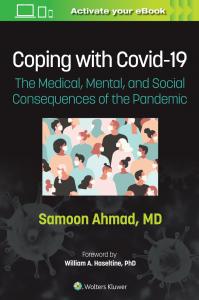The Current Normal and How We Move Forward
NEW YORK, NY, USA, May 11, 2022 /EINPresswire.com/ -- “Dr. Ahmad explores complex issues such as difficult ethics issues, psychosocial impacts, and how to prepare our physicians for future pandemics. While intended for a clinical audience, the work is accessible to anyone who is looking to deepen their understanding of how the pandemic will shape our future” – William A. Haseltine, Ph.D, Chair and President of ACCESS Health International
“Coping with COVID-19: The Medical, Mental, and Social Consequences of the Pandemic” is the book that everyone needs on their bookshelf as the world grapples with the effects of the past two years. Written with a general audience in mind, the book explores the science of the SARS-CoV-2 virus, the psychosocial consequences of the pandemic, and the ripple effects that the pandemic will have on society for years to come. Dr. Ahmad’s expertise in the psychology of
In addition to examining the psychological burden the nation has faced during the consecutive Delta and Omicron surges, Dr. Ahmad’s book and research into the virus is also deeply personal, as he contracted COVID-19 in the spring of 2020. He then continued to work in a public hospital in New York City through the worst days of the pandemic, witnessing the effects of pandemic stress on frontline workers, clinicians, psychiatric patients, seniors, and adolescents first-hand. These experiences gave Dr. Ahmad a greater appreciation of the psychological effects of the pandemic and an understanding of how to address these issues as we move forward. He also recognizes the desperation many with long COVID experience as they seek out ways to treat lingering symptoms like brain fog and shortness of breath.
“There have been a multitude of authors who have tried to address the dark clouds of the COVID-19 pandemic,” said Dr. Robert Y. Berlin, PhD, a clinical psychologist based in Massachusetts. “The pandemic has resulted in a sobering sense of isolation, intense fear and anxiety, coupled with a loss of hope and maladaptive coping responses. The last two and a half years have devastated the nation’s mental health amidst a medical moment unparalleled in our lives. Dr. Ahmad has written a brilliant guide that addresses these wide-ranging phenomena and provides readers with a clear picture of how we can begin to emerge from the pandemic era.”
At its core, the message contained within Coping with COVID-19 is that a healthy reemergence after this tragedy will require major changes to how we think about psychological stress, mental health, and the role that both can play in regulating one’s overall well-being. Dr. Ahmad also offers some suggestions about changes individuals, organizations, and policymakers can make to facilitate these changes and resolve some of the key issues at the heart of the nation’s mental health crisis. Restoring a sense of harmony and stability will require not a return to where we were before the pandemic, but rethinking where we want to be, and then taking concrete steps to get there.
“Dr. Ahmad has written an important book that focuses on the sociological and psychological effects of the pandemic on individuals from all walks of life,” said Prakash Masand, MD; CEO, Centers of Psychiatric Excellence (COPE). “One of his key insights is how variables like social isolation, poor diet, substance use, and lack of exercise can contribute to the overall sense of anxiety that has defined the past two years. His book provides a roadmap for the best path forward, incorporating all modalities of treatment, including lifestyle changes."
“Coping with COVID-19: The Medical, Mental and Social Consequences of the Pandemic” is available now via Amazon, Barnes & Noble, and Wolters Kluwer. Dr. Ahmad is available for lectures, interviews, and virtual events. For more information, visit https://www.cov19book.com.
Title: Coping with COVID-19, The Medical, Mental and Social Consequences of the Pandemic
Publisher: Wolters Kluwer
Publication Date: April 1, 2022
Price: $49.99
ISBN/ISSN: 9781975188993
About the Author
Dr. Samoon Ahmad is a Clinical Professor of Psychiatry at NYU Grossman School of Medicine. He has also served as the Unit Chief of Bellevue Hospital Center’s Inpatient Psychiatric Unit, where he remained on the frontlines throughout the course of the pandemic before retiring after 30 years of service in February 2022.
Dr. Ahmad is also the founder of the Integrative Center for Wellness, where he incorporates psychiatric treatments and specializes in treating patients with depression, anxiety, bipolar disorder, ADHD, stuttering and weight management issues. He is a frequent lecturer on various topics including the treatment of mood and anxiety disorders, obesity, the use of medical marijuana, and more recently, the psychological effects of the COVID-19 pandemic.
He is a Diplomate of the American Board of Psychiatry and Neurology; a Distinguished Fellow of the American Psychiatric Association; Associate Member of the Royal College of Psychiatrists, U.K.; and he holds licenses in New York, Connecticut, Pennsylvania, Florida, California, Massachusetts, and Maine.
Dr. Ahmad has co-authored and served as contributing and consulting editor for various textbooks in psychiatry, including the recent edition of Kaplan & Sadock’s Pocket Handbook of Clinical Psychiatry and Medical Marijuana: A Clinical Handbook.


No comments:
Post a Comment